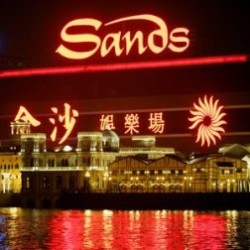Macau Weighs Heavily On Las Vegas Sands Q1 Earnings

Amongst the world’s biggest casino operators, Las Vegas Sands Corp (LVS) holds an important position as the company was founded by the billionaire Sheldon Adelson, a major campaigner against online gambling in the United States. On a more positive note, however, the American business magnate was the first operator to foresee the lucrative potential of Asia, and consequently placed his company closer to the Asian market before any of his competitors. Nevertheless, in the first three months of 2015 both LVS revenues and profits stumbled as the operator couldn’t separate itself from the negative growth currently being experienced in the Macau casino market.
Revenues & Profits Dive In Q1
Consequently, revenues plunged by 24.5% to $3.01 billion in Q1 2015 compared to $4.01 billion in Q1 2014, while operating income was also down 37.8% to $711.1 million, along with profits down 34% to $511.9 million compared to $776 million for the same period a year earlier. The casino company missed first-quarter revenues and earnings as the key gambling markets of Singapore and Macau continued to contract, resulting in LSV stocks now being lower by nearly 25% compared to the start of the year. Nevertheless, do not feel too sorry for LSV as $511 million in net profit still represents a sizable sum that would surely be the envy of the company’s industry rivals.
Macau Revenues Disappointing
Las Vegas Sands Corp’s main revenue generator is its subsidiary Sands China Ltd, but in Q1 company revenues were cut by 34.9% to $1.77 billion, while profit were slashed by 54.2% to $344.7 million. Nevertheless, Sands China Ltd is not the only casino operator struggling with lower revenues as all the operators in Macau have similarly reported considerably drops in their earnings for a variety of reasons including labor unrest and a smoking bans. More damaging, however, has been the Chinese government’s corruption crackdown on money laundering and corrupt officials in China, resulting in a decimation of the VIP high-roller segment, and casinos profits therefore being lower across the board.
Consequently, LSV’s Macau casinos saw dizzying y-o-y net revenue drops for the quarter, including Sands Macao (-28%), Sands Cotai (-31%), Venetian Macao (-34%), and Four Seasons Macao (-56%). Addressing the turbulent situation in Macau, Adelson explained during a recent conference call:
“The operating environment in Macau, particularly in the high-end gaming segments, remained challenging during the quarter. I know you’re all waiting for me to predict if we’ve reached the bottom in Macau. It’s very difficult to make predictions, particularly about the future.”
Looking Ahead
Despite disappointing Q1 results, LSV founder Sheldon Adelson is not panicking and says he is very determined to find new opportunities and possibilities in the markets of Japan and South Korea. Furthermore, Adelson said that Las Vegas Sands Corp results were solid outside of Macau, with revenues for its USA operation declining by just -2%, and its Singapore operation, the Marina Bay Sands resort, down by -6% year-over-year.
Adelson also added that the company has successfully been attracting mass market customers, and managing to diversifying its key product into a more family-oriented package. In Macau, for instance, the company is re-branding its casinos as Las Vegas style resorts, offering all services and retail shopping for their customers. Likewise, Las Vegas Sands has aggressively been targeting the convention based sector, and as LSV CEO Adelson explains:
“Our convention-based Integrated Resort business model appeals to the broadest set of customers, generates the most diversified set of cash flows, delivers the industry’s highest revenue and profit from non-gaming segments and brings the greatest economic and diversification benefits in the industry to the regions in which we operate.”
LSV Shares
Las Vegas Sands Corp (LVS) shares are currently trading at $55.25, up from a 52 week low of $49.82 but significantly below the company’s one year high of $81.25, thus giving LSV a market capitalization of $44.08 billion. Market analysts weighing in on the company seem upbeat about LSV, with Stifel Nicolaus setting a price target of $62.00, Vetr a target of $55.36, and JPMorgan Chase a price target on shares of $57.00, down from its earlier buy rating of $60.00. After LSV released its results on April 22nd, it also announced a $0.65 dividend per share, with Adelson commenting:
“The prudent management of our cash flow, including the ability to increase the return of capital to shareholders while maintaining a strong balance sheet and ample liquidity to invest in future growth opportunities, remains a cornerstone of our strategy.”







